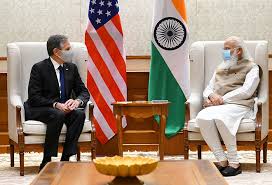The foreign policy of India is a crucial aspect of its diplomatic engagement with the world. With a rich historical and cultural heritage, India’s foreign policy aims to safeguard national interests, promote peace, foster economic growth, and uphold its values on the global stage. In this article, we explore the key components and principles of India’s foreign policy, its evolving dynamics, and its role in shaping India’s global standing.

1. Historical Context
India’s foreign policy has been shaped by its historical experiences, including its struggle for independence from British colonial rule and its subsequent efforts to establish itself as a democratic nation. Influenced by leaders such as Jawaharlal Nehru and Mahatma Gandhi, India’s foreign policy has emphasized principles like non-alignment, peaceful coexistence, and anti-colonialism.
2. Panchsheel and Non-alignment
The principles of Panchsheel (Five Principles of Peaceful Coexistence) have been a cornerstone of India’s foreign policy. It includes principles like mutual respect for sovereignty and territorial integrity, non-interference in each other’s internal affairs, and peaceful coexistence. India’s non-alignment policy during the Cold War era aimed to maintain strategic autonomy by avoiding alignment with any major power bloc.
3. Economic Diplomacy
India’s foreign policy places significant emphasis on economic diplomacy, seeking to foster mutually beneficial relationships with countries around the world. India has pursued economic cooperation, trade agreements, and investments to enhance economic growth and promote its “Act East” policy, strengthening ties with Southeast Asian countries and other major global economies.
4. Regional Focus
India’s foreign policy is characterized by a strong regional focus, aiming to foster stability and promote cooperation in its immediate neighborhood. Initiatives such as the “Neighborhood First” policy highlight India’s efforts to enhance regional connectivity, address security challenges, and promote economic integration with neighboring countries.
5. Global Engagement
India actively engages with multilateral institutions and global platforms to contribute to global decision-making processes. It is a founding member of the United Nations and plays an active role in organizations like the G20, BRICS, and the World Trade Organization. India’s global engagement focuses on issues such as climate change, sustainable development, counterterrorism, and peacekeeping operations.
6. Security and Defense
India’s foreign policy includes a strong emphasis on national security and defense cooperation. It seeks to establish strategic partnerships and defense ties with key nations to ensure regional stability, combat terrorism, and protect its national interests. India also pursues active engagement in areas like maritime security and cybersecurity.
7. Evolving Dynamics
India’s foreign policy has evolved over the years to adapt to changing global dynamics. It has expanded its diplomatic footprint by actively engaging with African nations, the Middle East, Central Asia, and the Indo-Pacific region. India has also deepened ties with major powers like the United States, Russia, and European countries through strategic partnerships.
Conclusion
India’s foreign policy serves as a crucial tool for advancing its national interests, promoting peace, and fostering economic growth. Rooted in historical experiences and guided by principles of non-alignment, peaceful coexistence, and regional cooperation, India’s foreign policy continues to evolve to address contemporary challenges. By actively engaging in global platforms and pursuing economic diplomacy, India aims to shape a world order that reflects its values, aspirations, and pursuit of a peaceful and prosperous future.
Important Links